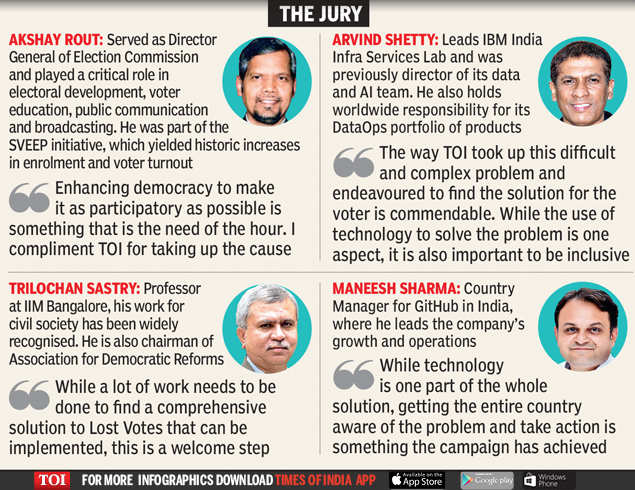Millions of Indians move across the country for work, education or with families. But the current electoral process demands that on Election Day, these crores of domestic migrants return to their home constituencies to cast their votes, which is often not possible. As a result, about 30 crore citizens are unable to vote. In January 2019, Times of India launched the Lost Votes initiative to highlight this issue and demand their inclusion in the electoral process.
Recently, Chief Election Commissioner Sunil Arora said the Election Commission is working on a tech-enabled solution for remote voting and is set to begin trials soon. And to support EC, TOI had launched the Lost Votes Tech Challenge last October, which created an opportunity for India’s finest tech minds to find a solution to the problem.


The challenge saw equal participation from students at prominent universities and professionals at IBM, TCS, Capgemini, Oracle among other organisations. After weeks of scrutiny, from more than 3,000 entries, the top 10 were shortlisted as finalists and mentored by IBM and GitHub to create the most viable solutions.
In December, finalists presented their solutions to a panel of judges, including academics, tech leaders and experts. Their ideas used concepts such as dynamic ballots, voice and facial recognition, and behavioural patterns. The teams also incorporated mechanisms to mitigate the ground level challenges of a remote voting system like vernacular voice assistance, voter education, voter fraud, Aadhaar-based authentication, virtual VVPAT and poll booth security. To ensure anonymity of voters, all solutions leveraged block-chain encryption systems. The solutions were also auditable and tamper-proof to prevent hacking.
This is the beginning of the development of a robust solution, helmed by TOI and its partners Github and IBM, under the aegis of experts. An ideal remote voting solution will mimic the existing voting process while addressing security and privacy concerns in a virtual environment.




















